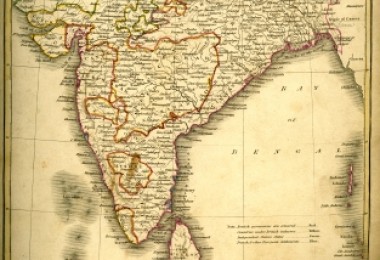
O Rromano them tradyas hai beshlas ande mai but de pinda thema ande lumiya antrego desar o vakto kana telyardyas katar e Indiya. Le populatsiyi Rromane si gichime te aven katar desh zhi-ka desh-u-shtar milivoya zhene ande lumiya antrego. O mai but le Gazhikane skolarichi alon/alosaren te pakyan ke le Rroma telyarde katar e Indiya sa kethane (katar o panshto zhi-ka o deshto kentuyiya pala-Kristoste) worta kai Anatoliya, thai pala kodya tradyas ando Balkano thai mai palorral, ande Ivropa antrego. Ande kakale neve thema, kerdine kontakto avre shibansa thai kulturansa kai azbadine e Romani shib thai kultura hai parrudyile prya but e Rromani shib thai kultura originalni. Akana, mai moderni studiyi punktil karing ekh mai nevikani teyoriya, ke le Rroma tradine katar e Indiya ande mai tsine grupurya ande l’ desh-u-yekhto hai desh-u-duito kenturiyi kana intreginas-pe le Gaznavidonsa katar e Gazna telal o Mahmud Ghazni (akana bushol Afganistan) thai ferdi avile yekh narodo/natsiya kana sas sa-kethane ande Anatoliya mai anglal te zhantar ka l’ avre thema. Thai-vi. le phurane teyoriyi sayek mothode ke le mai-anglune Hindukurya kai tradine katar e India sas artizanurya hai komedyasha, e mai nevi teyoriya propozil kathanitsko polekra, te phenel chachimasa, Rajput. Po kaver wast, katar e Rromani kezdiya, le Rromane familiyi thai vitsi anavyarenas-pe pala e buki worka pramata kai kerenas hai kakale kamas-parrudyon pala o lokalno ekonomiya thai oportuniteturya disponibli lenge.
Kodo te avel sar shai, zhi-akana istoriyasha thai lingwisturya xan-pe anda penge teyoriyi hai anda le daturya pe pushimata fundamentalni kai azban e kezdiya ande studiyi Rromane, si wuni paramaterya kai shai wodin amen kai e mai angluni istoriya le Rromengi. Mai angluno, o Rromano narodo avilo katar e Indiya thai e Rromani ship avel katar le Indo-Ariyanítska shiba. Te chi denas-duma ekh mutuwalno shib kana telyarde la indiyatar, musai sas lenge te denas-pe duma ges-gesestar swatonensa hai gramatikasa kai line katar but shiba Hindukitska Pakriturya that-vi fetsi katar o Sanskrito. Segundones kana le Romane parinturya tradenas katar e Indiya, kidine but swaturya fundamentalni ando pengo vokabulariyo, swaturya katar e Farsikonitska, e Kurditska thai e Armenítska numa le mai but swaturya kidine avile katar e Gerkitska kana beshenas le Rroma ande Anatoliya ando vakto Vizantiyako. Ferdi le grupurya kai telyarde le mai anglune katar e Vizantiya, le Roma kai beshle do mult, kidine but, but swaturya Gerkitska. Kakale swaturya si o segundo mai baro prochento la Rromanya shibako palal le swaturya katar le shiba Ariyanitska ande mai phurani shib kai denas duma le Rromane parinturya mai anglal katar won telyarde te traden ande Ivropa hai kakale swaturyai shai dikhyon ande le mai but Rromane diyalekturya. Tritones, bare Rromane grupurya tradine, mai angluno ando Bakano (desh-u-trinto kenturiya) mai palorral, nordoste kai Ivropa (ando desh-u-shtarto hai desh-u-panshto kenturiyi) thai ande wurma, ando desh-u-inyato kenturya katar e Moldaviya thai e Vlaxiya (Akana Rumuniya moderno) palal e Slobuzheniya hai tradine ka l’ Americhi, hai Ostraliya. Wuni Rroma sa-gata bishaldenas katar e Ivropa ka l’ Americhi ando veko koloniyalno an o desh-u-shofto kenturiya kai koloniyi Portugesítska thai Shpaniyolitska.
Referentsiyi:
Bakker, Peter and Kyuchukov, Hristo (eds), What is the Romani language?(Paris / Hertfordshire: Centre de recherches tsiganes / University of Hertfordshire Press, 2000).
Fact Sheets on Roma, Romani Projekt, Council of Europe. Retrieved 3 Sept 2011 from: http://romafacts.uni-graz.at/index.php/history/early-european-history-first-discrimination/arrival-in-europe
Fact Sheets on Roma, Romani Projekt, Council of Europe. Retrieved 3 Sept 2011 from: http://romafacts.uni-graz.at/index.php/history/second-migration-intensified-discrimination/second-migration
Karanth, Dileep (ed.), Danger! Educated Gypsy. Selected Essays. Ian Hancock (Hertfordshire: University of Hertfordshire Press, 2010).
LeBas, Damian and Acton, Thomas (eds), All Change! Romani Studies through Romani eyes (Hertfordshire: University of Hertfordshire Press, 2010).
Marsh, Adrian and Strand, Elin (eds), Gypsies and the Problem of Identities. Contextual, Constructed and Contested. Transactions Vol. 17 (Istanbul: Swedish Research Institute in Istanbul, 2006).

Ilektrolil/emeylo (Kalderash)
emelo (Gurbeti)
e-mailo (Lovari)
Emaili (Xoraxane)


